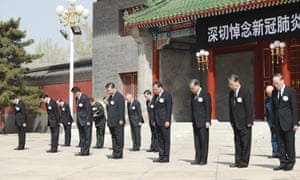The Guardian view on the politics of generosity: gifts with price tags
China’s supplies of medical goods have been greeted with cynicism as well as gratitude
- Coronavirus – latest updates
- See all our coronavirus coverage

Photograph: Pang Xinglei/AP
Just how generous is generosity? Almost a century ago, the French sociologist Marcel Mauss wrote a seminal essay exploring how gifts establish status for the giver and an obligation on the part of the recipient. Now the complex relationship between munificence and self-interest is playing out at the international level. Are shipments of essential medical products a form of altruism, or something more self-serving and even sinister?
China, which says it has provided assistance to more than 120 countries and four international organisations, is practising “mask diplomacy” – or, as others have put it, more pointedly, “the politics of generosity”. In addition to goods supplied by Beijing – some donated, but many sold – have come those from institutions and companies, such as the telecoms giant Huawei. Some gifts are sent by ordinary Chinese people who have lived through the fear and stress themselves and want to help out others. A significant number of these efforts, however, are almost certainly initiated and coordinated by the state.
Putting aside the issues of quality that have seen significant quantities of Chinese goods rejected, the central question is what Beijing wants in exchange. Gifts between nation states – or even necessary purchases of goods in high demand – are rarely prompted entirely by uncomplicated altruism. Angela Merkel has already described this as a matter of reciprocity: China responding in kind to the supplies it received when its own outbreak was at its height.
But there is, clearly, more at stake. Beijing has heavily promoted its shipments through its own media outlets and European politicians have repeatedly singled it out for praise. Michael Gove mentioned that Germany and Switzerland were supplying ventilators to the UK, but explicitly thanked China for helping to source others. European officials, who helped China when it was in crisis but were asked not to advertise their support, feel that Beijing is grandstanding and that the European Union is being undermined as leaders denigrate its efforts while praising Xi Jinping.
China has long sought to expand its influence in Europe. But a more critical factor is likely to be its determination to change the narrative over a pandemic which originated in Wuhan and which authorities initially sought to cover up. Had they been more open from the start, the outbreak might have been containable. The shipment of masks across the world cannot compensate for that, nor be allowed to disguise it. Thankfulness for necessary supplies should not suppress justified criticism.
The problem is not the goods themselves, so urgently needed, but the price tag attached. If Beijing expects a quid pro quo beyond repairing the damage to its reputation, as many surmise, it is up to the leaders of democratic nations to make that clear, and decide what price is worth paying. While critics fear that the world will see an expansion of Chinese power, the outcome might equally be a shift towards reduced reliance on Chinese factories for essential supplies.
Meanwhile, Donald Trump also demands gratitude, boasting that the UK has asked for 200 ventilators, even as his country exerts its power to snatch resources from other nations in need. Looking for a scapegoat due to his abject failure to protect Americans, he has turned on the World Health Organization and suggested he could halt its funding, accusing it of being “wrong about a lot of things”, and “biased” towards China. The politics of generosity needs to be dissected. But it will be more effective when other nations fail to establish a collective response to the virus, and the Trump administration practices the politics of serving itself.



